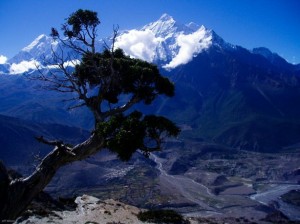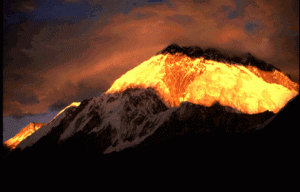Vanished US tourist points to dark heart of Himalayas
After travelling through Sri Lanka and India, American yoga teacher Aubrey Sacco decided to cap her six-month trip of a lifetime with a solo trek in Nepal’s majestic Himalayas.
The 23-year-old told her family she would be hiking in Langtang National Park, on the Tibetan border, and would check back with them in a few days. They never heard
from her again.
Two years later, her mother has returned to the country accusing Nepal of indifference to a case that has highlighted the dangers of women trekking alone in the world’s most famous mountain range.
“We have been to Nepal three times to meet with police officials to find out what they have done in investigating for my missing daughter,” Aubrey’s mother Connie told reporters this week.
“It should not be our job to investigate this, it’s their job.”
Aubrey was last seen in Langtang village on April 22, 2010. Villagers there initially told her parents she left in the afternoon but some later changed their stories, saying they hadn’t seen her.
The Saccos accept that Aubrey may have died in an accident but they fear the Nepal authorities refuse to consider more sinister alternatives because any suggestion of a sex attacker at large could be devastating for tourism.
The family have cultivated local contacts, enlisted senators and congressmen in their home state of Colorado and even have the FBI working on the case, but they say the search is being hindered by “red tape” in Nepal.
A sweep of the area around Langtang village at the time and subsequent searches have turned up no body and no avalanches were reported.
Lie detectors and sensing equipment that could locate a body — even after two years — have been made available through the US Embassy but have not yet been used by Nepali police, Connie Sacco said.
“This makes us suspicious that the government and police may not want to find out what happened to Aubrey,” said Sacco, who has asked for a meeting with Prime Minister Baburam Bhattarai.
Nepal police have defended their actions, telling AFP they had searched the area thoroughly and had even sought help from witchdoctors.
Aubrey’s disappearance is one of a growing caseload of unsolved attacks and unexplained deaths in Nepal’s popular trekking areas.
American Lena Sessions, 23, was hiking alone in December in the area where Aubrey went missing when a man wearing a black mask approached her with a tribal “khukri” knife and threatened her.
She told police she managed to escape after her assailant threatened to kill her if she did not submit to a sexual assault.
The incident occurred a week after a South Korean woman had been assaulted, also in Langtang National Park, and the US Embassy now warns against hiking alone
in Nepal, stating that two American women were attacked and seriously injured in 2010 on popular trails.
The British Foreign Office website also warns of “isolated incidences of rape” on trekking routes.
Sacco believes the attempted attack on Lena Sessions, Aubrey’s disappearance, and other cases may be connected.
“There is a very bad man on the loose in the area where many women trekkers trek alone and where harm can come to the women and young girls of the villages,” she said.
In the recent assaults the women have lived to tell the tale, but several trekkers have not been so lucky.
In 2005 Celine Henry from France and, separately, Sabine Gruneklee from Germany disappeared while trekking on the fringes of the Kathmandu valley.
Gruneklee’s badly decomposed body was found in 2006 but Henry remains officially missing.
In the same year German trekker Kristina Kovacevic disappeared in the Everest region while trekking alone. Her body was later found in a ravine and police said she fell, but her family believe she was murdered by bandits.
The Trekking Agencies Association of Nepal told AFP it was impossible to ascertain whether any of these cases were linked but could not rule it out.
“People who come trekking in Nepal should take at least one person with them,” Mahendra Singh Thapa, the association’s president, said.
Despite police claims to the contrary, Aubrey’s mother remains unconvinced the authorities are doing enough to protect Western trekkers.
“The trekking season is here and this area is not safe,” she said.
Turkishpress.com


